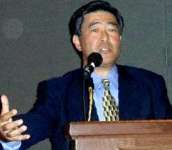Los Angeles Seminar Report: USC Professor Yuichi Iwaki on U.S. University System
Takahiro MIYAO (Professor, GLOCOM, and Head, Japanese Institute of Global Communications)
Seminar Report
[Japan Business Association of Southern California] |
| Special Seminar: |
| Date/Time: | May 27 (Thr), 11:30 - 13:30 |
| Place: | Marriott Hotels & Resorts, Torrance, California, USA |
| Program: | 11:30 – 12:15
Luncheon and networking
12:15 – 13:30
Speaker: Yuichi Iwaki, MD,. Ph.D (Professor of Urology, Surgery & Pathology, and Director, Transplantation Immunology, Keck School of Medicine, University of Southern California)
Topic: U.S. University System
Language: Japanese
|
| Sponsor: | Japan Business Association of Southern California (http://www.jba.org) |
 A special luncheon seminar featuring USC Professor Yuichi Iwaki, one of the world's leading figures (doctor, researcher, administrator and entrepreneur) in the field of transplantation immunology, was held in Los Angeles on May 27, 2004. A special luncheon seminar featuring USC Professor Yuichi Iwaki, one of the world's leading figures (doctor, researcher, administrator and entrepreneur) in the field of transplantation immunology, was held in Los Angeles on May 27, 2004.
Dr. Iwaki gave a detailed account of the U.S. university system by referring to USC as an example, in contrast to the Japanese university system, which he is also familiar with as a university faculty member in Japan. He emphasized the difference between the U.S.and Japanese university systems as follows:
1) Appointment system: Unlike the Japanese system, where presidents, chairpersons and even professors are often selected by elections among university members, there are no such elections held in the U.S. system, and instead the university's board of trustees, consisting of community and business leaders outside of the university, can appoint a president as the most suitable and capable person to lead the university in the desirable direction that is set by the board of trustees. And the president can appoint school deans all by himself and, in turn, each dean can appoint the chairpersons of the departments at his school, and so on.
2) Revenues and endowment funds: Unlike typical Japanese universities which depend on students' tuition fees and governmental subsidies, U.S. universities are trying hard to attract research grants, private contributions and donations as well as business revenues. Also the university's endowment fund, about 2 billion dollars in the case of USC and close to 20 billion dollars at Harvard, is quite important as it is professionally managed to yield a large amount of returns, which the president can spend at his discretion to fund new and innovative programs for the future of the university. Such endowment funds come from various sources, and most notably from alumni and parents, partly supported by tax exemption for donations to educational institutions.
3) Excellence of small colleges: Not only large universities such as USC, but also small liberal arts colleges can offer first-rate programs and attract first-rate students from all over the world, if extra efforts are made to collect a large amount of endowment and utilize it efficiently and wisely in cooperation with students, parents and alumni.
4) Bottom line and faculty salaries: Bottom line figures are crucially important for each school, each department, or even each program, and those figures tend to determine faculty salary levels, which vary substantially from department to department and even from person to person. It is important to understand this severe environment in which U.S. universities flourish not only in academics but also in extra-curricula activities such as sports in the case of USC.
5) University characters: Good universities could recruit only "all A students," but that might not contribute to the building and nurturing of the unique character of each university. As a result, university policies are playing an important role not only in research but also in student recruitment in contrast to the Japanese university system, where entrance exam scores dictate student admission in a mechanical way. U.S. universities cannot be homogeneous ("kintaro-ame) " like Japanese universities.
After the presentation, a lively discussion took place, mostly focusing on various characteristics of U.S. professional schools as well as the nature of profession and students (and applicants) at such schools. The audience seemed quite impressed with Dr. Iwaki's deep knowledge about university systems in the both countries and frank attitude in answering their questions.
|





